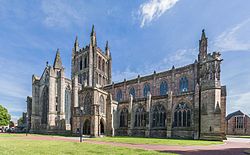Sir Richard Waldegrave was an English knight and Member of Parliament, who served as Speaker of the House of Commons from November 1381 to February 1382.
The table of years in music is a tabular display of all years in music, to provide an overview and quick navigation to any year.
The constituency of Gloucestershire was a UK Parliamentary constituency. After it was abolished under the 1832 Electoral Reform Act, two new constituencies, West Gloucestershire and East Gloucestershire, were created.
Adam Orleton was an English churchman and royal administrator.
This article is about the particular significance of the century 1301–1400 to Wales and its people.
William Dalderby was an English politician. He was a Member (MP) of the Parliament of England for Lincoln from October 1383 and January 1404. William, the second son of Robert Dalderby, prospered in the wool trade. In September 1378, William became bailiff of Lincoln, and soon thereafter he received his first royal commission. During his year in office in 1383 as MP, his term was uneventful.
Henry Catchpole was an English politician.
Sir John Roches (c.1333–1400), of Bromham, Wiltshire, was an English admiral, diplomat, magistrate and politician.
The bailo and captain of Negroponte was the representative of the Republic of Venice stationed at Chalcis (Negroponte) on the island of Euboea. The bailo played an important role as the mediator between, and de facto overlord of, the triarchs of Euboea, who had their common residence in Negroponte. The triarchies were created by the division of the island between three rulers (triarchs) after its conquest following the Fourth Crusade (1204).
Hugh Fenn, also written Fenne or atte Fenn, was an English businessman from Great Yarmouth in Norfolk who was active in local and national government during the reigns of Kings Richard II and Henry IV. It was a ship he part-owned which in 1406 captured the future King James I of Scotland.
Henry Popham was an English landowner, administrator and politician from Popham in Hampshire.
Sir Otto I Bodrugan, his name often written at the time as Otes, was an English landowner, soldier and politician from St Goran in Cornwall.
